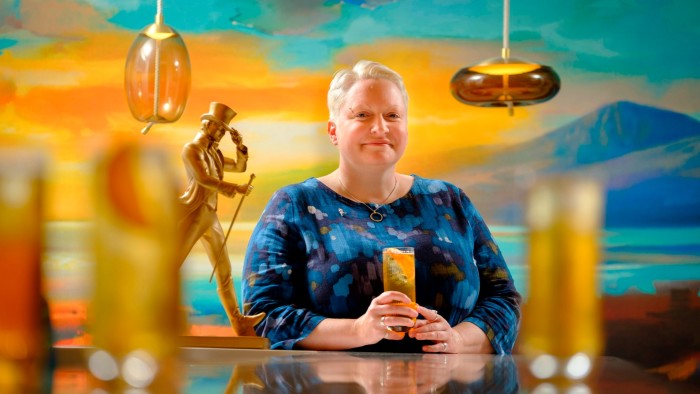Unlock the Editor’s Digest for free
Roula Khalaf, Editor of the FT, selects her favourite stories in this weekly newsletter.
Diageo’s marketing team recently went through its brand advertising archive asking who they pictured when imagining a whisky drinker.
Thinking back two decades, to when chief marketing officer Cristina Diezhandino started working in the alcohol business, the answer was simple: a man in a suit. Diezhandino joined Diageo 18 years ago, at a time when advertising for its flagship Johnnie Walker brand overwhelmingly depicted serious men and their gritty endeavours. In keeping, the company’s leadership team was male-dominated.
But their responses for 2024, by contrast, reflected the upbeat and colourful Johnnie Walker adverts of today: a cast of young people of varied genders and from a range of ethnic backgrounds.
“A more inclusive approach to our brands and marketing, and to our business in general, drives performance,” argues Diezhandino.
It is reflected in senior roles, too. In 2021, Johnnie Walker appointed Emma Walker as the first female Master Blender in the brand’s 200-year history.
Overall, the proportion of women in leadership roles at the London-listed company is 44 per cent. And Diageo — which comes fourth in this year’s FT/Statista ranking of Diversity Leaders — has set out to fill half of these leadership roles with women by 2030.
Another company target had been to fill, by the same year, 45 per cent of leadership roles with people from ethnically diverse backgrounds — but that has already been achieved: the figure currently stands at 46 per cent.
Diversity is found in the boardroom, too: seven of the company’s 10 board directors are women and four self-disclose as being from minority ethnic groups.
Diezhandino says that these diversity and inclusion efforts have been a necessity to ensure that Diageo’s brands — which also include Captain Morgan rum, Smirnoff vodka and Tanqueray gin — resonate with its broad range of customers across 180 countries.
Louise Prashad, Diageo’s chief human resources officer, also believes that “goals are a great way of driving change within a business”. She adds, however, that “any progress on diversity should also be complementary to our wider business performance”.
“We don’t think of it as an ‘either or’,” Prashad explains. “We believe that being a more inclusive, more representative business makes us better at reflecting and serving our global base of consumers, as well as ensuring we can access the broadest talent pipelines.”
With famous brands such as Johnnie Walker and Guinness, Diageo says its marketing teams set out to overturn stereotypes or cultural associations that the drinks might hold and, thereby, broaden the focus of their marketing efforts to a much larger set of demographics.
Among the women signed up by Johnnie Walker to be a face of the brand in recent years has been Indian actor and film producer Priyanka Chopra. Another has been the British actor Jodie Turner-Smith.
But Diezhandino emphasises that representation extends beyond what consumers see in product advertisements. “We’ve done a ton of work in regards to gender equality in the creative industry,” she says.
Last year, half of Diageo’s global campaigns were shot by female directors or photographers. “It’s not just about the casting we now have,” Diezhandino notes. It is also a matter, she points out, of “Who’s behind the camera?”
“Launching inclusive policies is critical, but embedding them across a global company, the size of Diageo requires real effort and time,” says Prashad.
The company’s head of HR adds that her team is now focused on ensuring employees know about the company’s progressive policies — and encouraging them to take them up.
In 2021, for example, Diageo launched a set of guidelines on menopause awareness, aimed at lifting the taboo on this stage of a woman’s life.
The programme includes means of support such as access to counselling or mindfulness sessions, as well as flexible working or sick pay entitlements, when needed.
The company provides six months paid parental leave. The new parents who took up the family leave policy in the year to June numbered 1,543. “We are currently looking at how we can better support people when they return from family leave,” says Prashad.
“It’s a big transition and just as we enable new parents to have precious time with their families, we know how hard it can be for people returning back to work.”
Read the full article here

